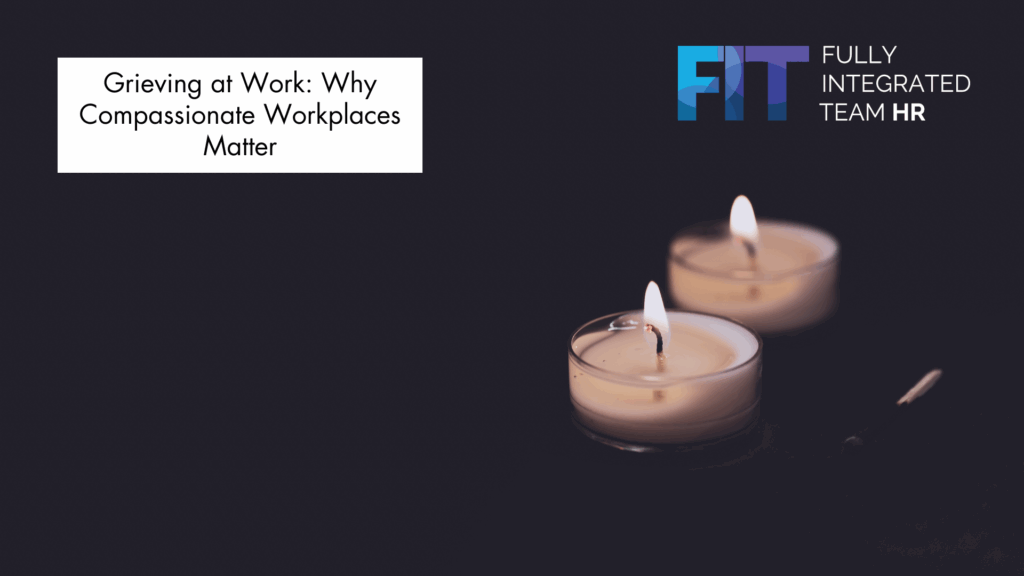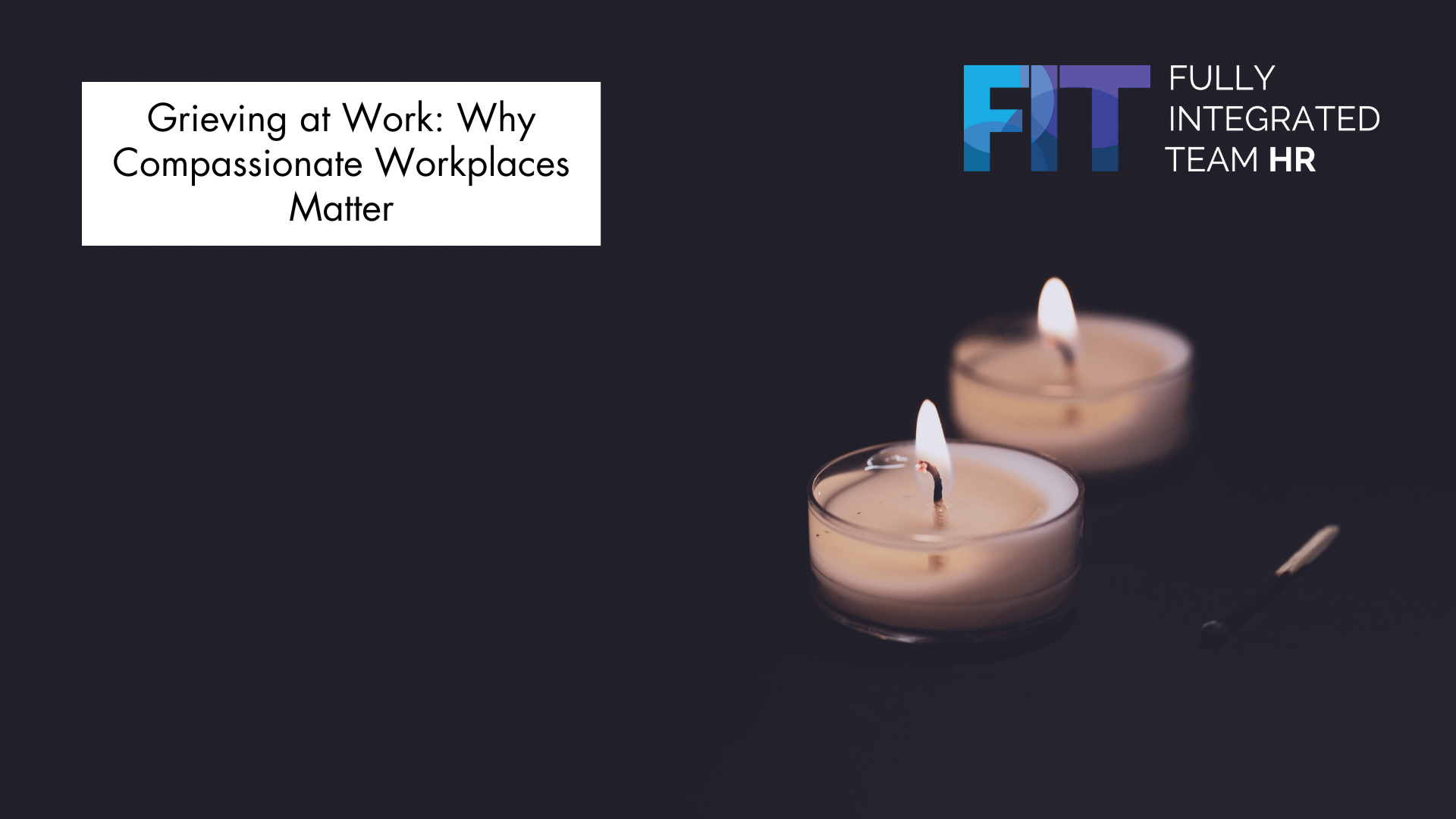by Lisa Llewelyn | Senior HR Consultant
Table of Contents
Introduction: The Unseen Weight We Carry
Grief doesn’t clock in or out. It doesn’t respect business hours or deadlines. Yet in the modern workplace, we’re often expected to keep performing through loss, as though heartbreak can be managed like a task on a to-do list.
Over the past 25 years, I’ve lost both of my parents, several close friends, and experienced personal trauma that shaped every part of my life. Through it all, I kept working – sometimes thriving, often just surviving. But it wasn’t until recently, through a course on mental fitness, that I began to truly understand how deeply grief had impacted my focus, effectiveness, and presence at work.
The Power of AwareNESS: Finding Language for Hidden Pain

Earlier this year, I took the Positive Intelligence course, developed by Shirzad Chamine and taught by Loala McCann of Intrinsic Now. It gave me the tools to name what I had been silently managing for decades – grief. The program focuses on quieting your inner saboteurs and strengthening the part of you that leads with empathy, calm, and clarity.
Loala’s compassionate and skillful teaching helped surface what I had been pushing down in order to keep functioning. I came to realize that unresolved grief had become a kind of background operating system in my life – affecting my energy, patience, and decision-making without me even knowing it.
The Reality of Grief in the Workplace
Grief isn’t just emotional – it’s physical, cognitive, and relational. It can cause:
- Difficulty concentrating
- Emotional reactivity or numbness
- Fatigue or insomnia
- Memory issues
- Lowered productivity or engagement
Because grief is invisible, it often gets misinterpreted. Coworkers or managers may perceive a grieving employee as disengaged, unreliable, or underperforming – when in fact, that person is doing their best just to show up.
After losing a very close work colleague in an extremely traumatic way, I told my boss I thought I needed grief counseling. I was crying continually and struggling to even get out of bed. His response? “You don’t need a counselor; you just need a glass of wine.” That was the moment I realized I had to step up, mask the pain, and move on. But of course, I didn’t move on – I pretended to.
At a recent professional meeting, Jennifer R. Levin, MFT, PhD, founder of Traumatic Grief Solutions, spoke with striking clarity about the long-lasting toll grief can take on mental health, especially when the loss is sudden or traumatic. She reinforced how grief doesn’t end when the memorial service is over – its emotional, physical, and cognitive impacts can echo through months or even years of work life.
Yet Dr. Levin also shared a message of hope and responsibility: that employers have the opportunity – and obligation – to respond with compassion. She highlighted how some companies wisely call on Employee Assistance Programs (EAPs) to support their teams when trauma affects the workplace. That act alone – acknowledging loss and offering professional help – can validate grief and prevent deeper burnout or disengagement.
Where the System Falls Short: The Limitations of FMLA and Bereavement Leave
The Family and Medical Leave Act (FMLA) allows employees to take unpaid leave to care for a seriously ill family member. But when that loved one dies, the protection ends. Just as someone moves from caregiver to griever, they lose legal protection and job security – at their most vulnerable moment.
Bereavement leave, if offered, is typically three to five days. That’s barely enough time to handle funeral logistics, let alone begin to process a major emotional loss. When we return to work, the message – whether said out loud or not – is often: Time to move on.
But grief doesn’t operate on a timeline. It returns in waves, anniversaries, quiet mornings, and random reminders. Expecting someone to be “back to normal” within a week is unrealistic. And although it is generous when companies step up and offer any time for bereavement, it doesn’t change the fact that an employee will be affected by grief long after they return.
How Employers Can Better Support Grieving Employees
It’s time for a cultural shift – one that moves from silent endurance to open support. Here’s where workplaces can start:
- Normalize Grief at Work
Acknowledge that grief is not a sign of weakness. Create space for conversations, empathy, and check-ins. - Extend Bereavement and Post-Care Leave
Consider policies that reflect the reality of grief’s timeline – not just the funeral period. - Leverage Employee Assistance Programs (EAPs)
Ensure these resources are not only available, but actively promoted and de-stigmatized. - Encourage Manager Training in Emotional Intelligence
Equip leaders with the skills to respond with empathy and flexibility. - Introduce Tools Like Positive Intelligence
Mental fitness programs can help employees process grief while also supporting resilience and clarity.
Conclusion: Leading with Humanity Is a Business Imperative
Grief doesn’t make us broken. It makes us human. And workplaces that make space for that humanity build stronger, more loyal, and more resilient teams.
I know the toll grief takes. For years, I tapped it down and compartmentalized it – because that’s what I had to do to function. But I’ve learned that allowing it to surface is the first step toward healing. And when employers make room for that process – through empathy, flexibility, and real support – they don’t just help people grieve. They help them come back to life.
Let’s build more workplaces that understand this.
And let’s lead with the kind of compassion we all hope to receive in our hardest moments.
Resources for Continued Learning and Support
- Dr. Jennifer R. Levin – Founder, Traumatic Grief Solutions
- Loala McCann – Instructor, Intrinsic Now
- Positive Intelligence by Shirzad Chamine


